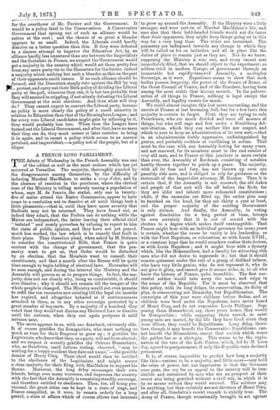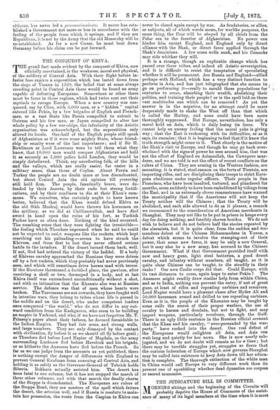A FRENCH LONG PARLIAMENT.
THE debate of Wednesday in the French Assembly was one of the oddest as well as the most serious which has yet occurred at Versailles. The majority, thoroughly puzzled by the disagreements among themselves, by the difficulty of inducing Marshal Macliahon to strike a coup d'Itat, and by the absence of reaction in the provinces, where the clerical tone of the Ministry is telling severely among a population of whom, says M. de Jonnes, the statist, only one in twenty- five of males attend the Easter Communion, appear to have come to a resolution not to dissolve at all until things look a little pleasanter,—that is, until they have more security that Radicals may not be returned. They have found out, as indeed they admit, that the Prefets can do nothing while the Makes are independent, the latter leaving their official chief " isolated " and nearly powerless by refusing to report to him the state of public opinion, and they have not yet passed, much less worked, the law which is to remedy that fault in their plans. They therefore plead, when asked by M. Dufaure to consider the constitutional Bills, that France is quite content with the change of government, that the pea- santry want to get on, that Order would be disturbed by an election, that the Members want to consult their constituents, and that a month after the Recess will be quite time enough to begin talking of electoral laws. November will be soon enough, and during the interval the Ministry and the Assembly will govern so as to prepare things. In fact, the ma- jority does not see clearly why, being so comfortable, it should ever dissolve ; why it should not remain till the temper of the whole people is changed. The Ministry would not even promise to refill the ten vacancies now existing till the legal six months has expired, and altogether behaved as if continuousness attached to them, as to any other sovereign protected by a great number of bayonets. By a majority of a hundred, they voted that they would not discuss any Electoral Law or dissolve until the autumn, when they can again postpone it until autumn next.
The move appears to us, with one drawback, extremely able. It of course gratifies the Bonapartists, who want nothing so much as time for their Emperor to grow up ; it gratifies the Legitimists, who know that they, as a party, will not be re-elected; and we suspect it secretly gratifies the Orleans Monarchists, who, as Gambetta, amid furious rioting, observed, "may be waiting for a happy accident they dare not name,"—the possible demise of Henry Cinq. Their chief would then be entitled to the obedience of the Legitimists, and might secure a clear majority for their King, with MacMahon to support his throne. Moreover, the long delay encourages their own friends, brings over many waverers, and impresses the country with the fact that the Assembly is remaining steadily sovereign, and therefore entitled to obedience. Then, too, all being pro- visional, the great cities can be kept in a state of siege, and France compelled, as it were, to remain orderly for a long period, a state of affairs which of course allows vast interests
to grow up around the Assembly. If the Ministry were a little stronger, and were cert tin of Marshal MacMahon's life, and sure also that their bald-headed friends would not die faster than their opponents, they might keep things going on in this way for a very long time. The cities are terrorised. The peasantry are indisposed towards any change in which they will be called on for an initiative, and all in place like the duties of place to remain just as they are. Nor do we know, supposing the Ministry a wise one, and every vacant seat immediately filled, that we should object to the experiment, so seldom tried in modern Europe, of government through an immovable but rapidly-renewed Assembly, a multiplex Sovereign, as it were. Experience seems to show that such bodies possess longevity, the power of the Senate of Rome, of the Great Council of Venice, and of the Conclave, having been among the most stable that history records. In the pulveri- sation of all things in France, nothing is legal except the Assembly, and legality counts for much.
We could almost imagine this last move succeeding, and the annals of France at last becoming dull, but for a few facts this majority is certain to forget. First, they are trying to rule Frenchmen, who are much divided and want all manner of things, but who will rage and fret under a Struldbrug Ad- ministration, which they can neither like nor respect, and which is sure to keep an administration of its own sort,—that is, an administration feebly oppressive, undistinguished by genius, and probably reckless or vacillating in action. That must be the case with any Assembly lasting for many years, and not renewed, for its members must in the end consist of very old men, and in France at this juncture is more certain than ever, the Assembly of Bordeaux consisting of notables hastily thrown together to patch up a peace. The majority, with all its fuss and fury, has not thrown up even one passably able man, and is obliged to rely for guidance on the statecraft of the Imperialist attorney, M. Rouher. Then it is certain that, if the Assembly is not renewed, the old dukes and people of that sort will die off before the Reds, for they are older and inherit more exhausted constitutions ; while, if the vacancies are filled up, the entire plan may be knocked on the head, for they are thirty a year at least, and the proper majority of the existing Government is only sixteen. And finally, the Assembly, in voting against dissolution for a long period of time, betrays its own certainty that it is out of accord with the electors to a degree which makes itself contemptible. That France might bear with an individual governor for many years is certain, whether the cause be vanity in his leadership, as with the First Napoleon, or exhaustion, as with Louis XVIII., or a constant hope that he would somehow realise their desires, as with Louis Napoleon ; and it might bear with a dynasty which, like the Hohenzollern, had a faculty for attracting able men who did not desire to supersede it ; but that it should remain quiescent under the rule of a group of disliked talkers, who have very little genius, who do not represent it, who do not give it glory, and cannot give it secure order, is, to all who know the history of France, quite incredible. The first suc- cessful soldier would take away the mace, and reign in the name of the Republic. For it must be observed that this policy, with its long delays, its conservatism, its fixity of plan, is consecrating not Monarchy, but Republicanism. The conscripts of this year were children before Sedan, and as children were bred under the Napoleons, have never heard of Henri Cinq, and do not remember Louis Philippe. Sup- posing them Monarchical, say, three years hence, they would be Bonapartists ; while supposing them moved, as most young men are moved, by the life they have lived since they were fifteen, they would be Republicans. Long delay, there- fore, though it may benefit the Conservative Republicans, can- not benefit the Monarchists, except that section which wears the golden bee as a shirt-pin. This seems to be the expla- nation of the vote of the Left Centre, which, led by M. Leon Say, agreed to postponement, if only the Republic were declared permanent.
It is, of course, impossible to predict how long a majority like this--content to be a majority, and little more—may hold the reins of power, but our impression is that the Germans once gone, the cry for an appeal to the country will be irre- sistible and unresisted by men who see no prospect of their secret aim being gratified without a civil war, in which it is by no means certain they would succeed. The soldiers may be anything, but they certainly are not devotees of Henri Cinq, and after all, Gambetta's recent remark is strictly true. The Army of France, though occasionally brought to act against
citizens, has never led a pronunciconiento. It never has esta- blished a Government not more or less in accordance with the feeling of the people from which it springs, and if they are Republican, it is not by the Army that the old Monarchy will be re-established. As for a new Caesar, he must beat down Germany before his claim can be put forward.



































 Previous page
Previous page